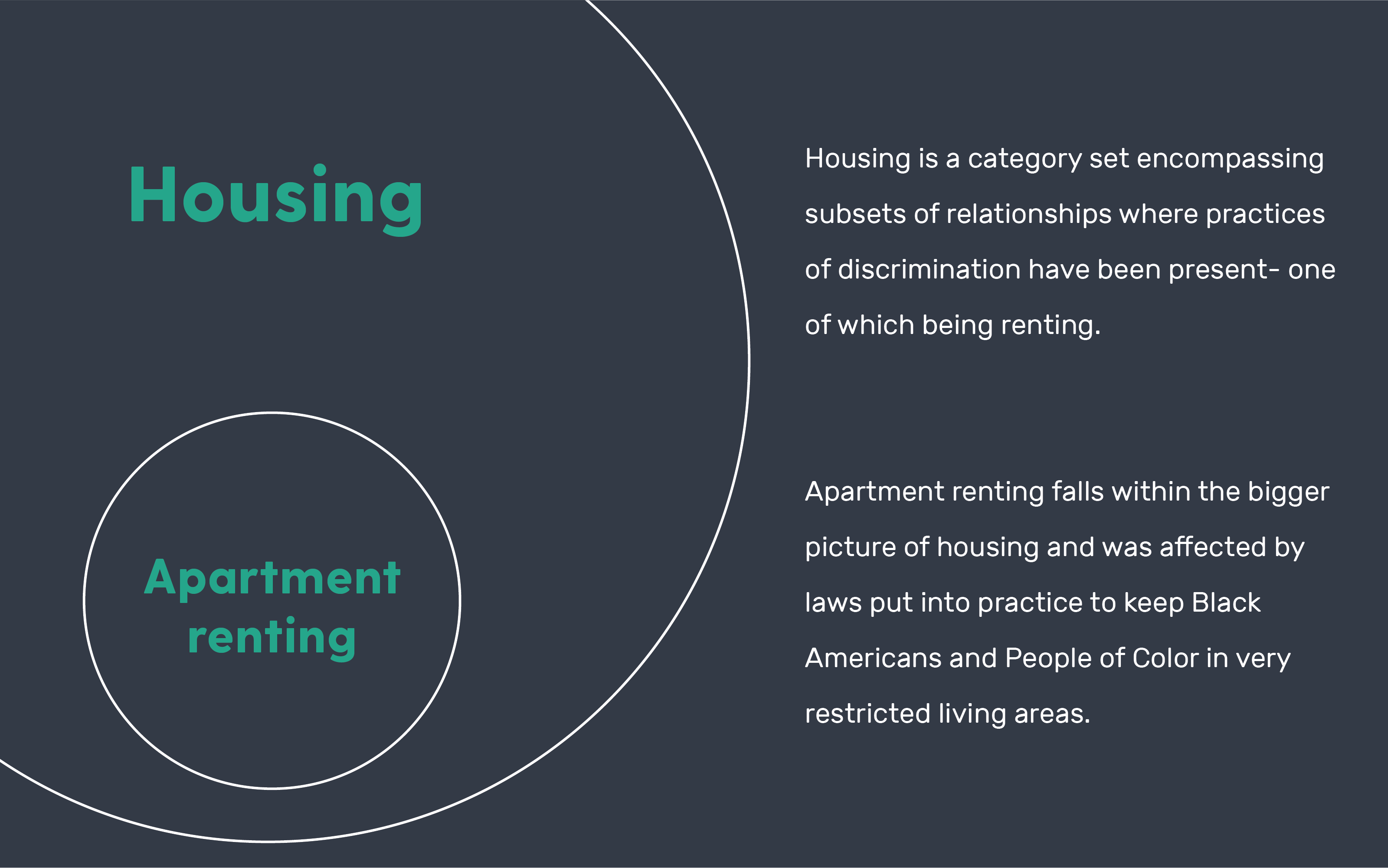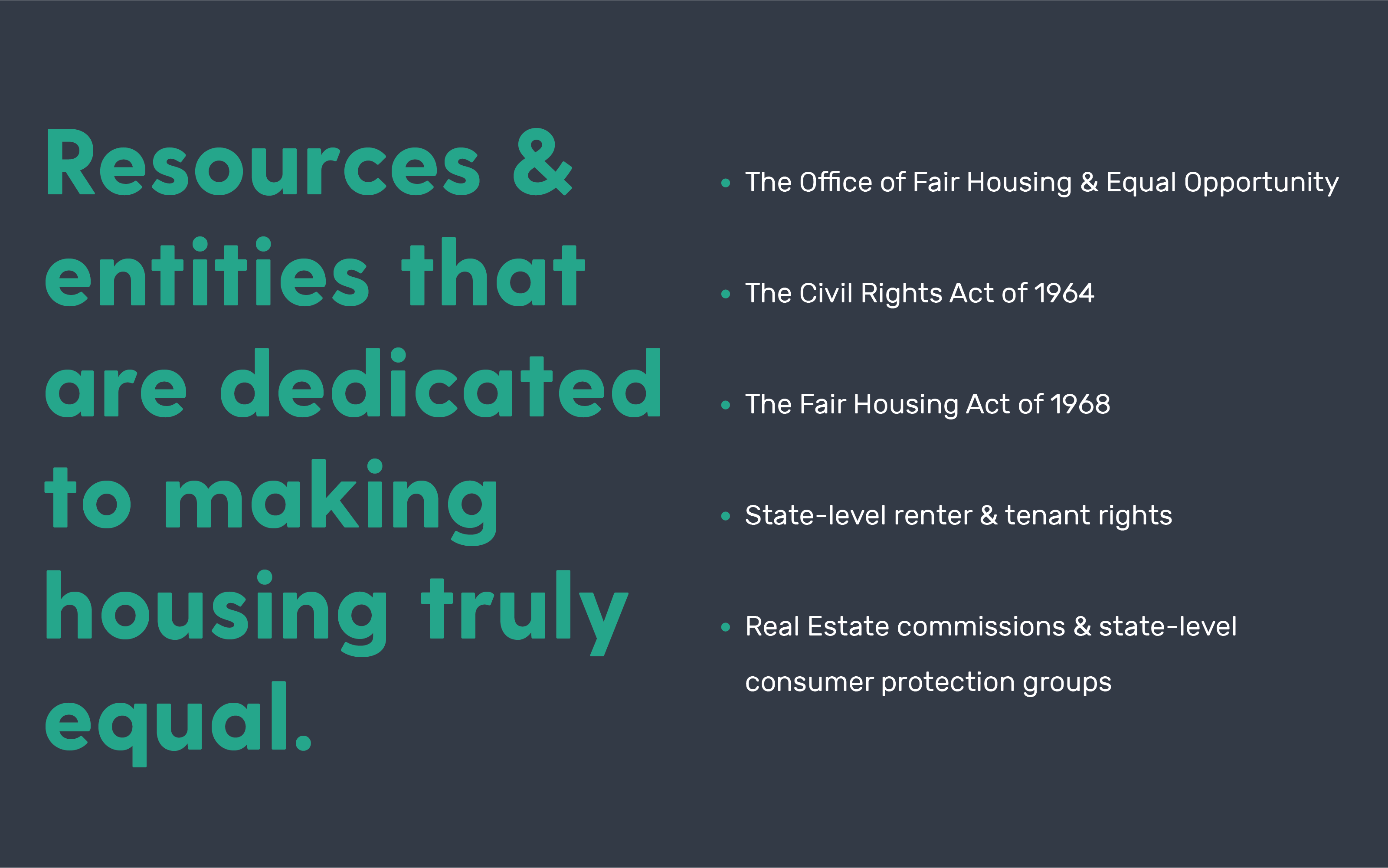Discrimination Within The History of Renting

Updated June 19, 2021:
Today, so many people in America are celebrating the significance and lasting effects of June 19, 1865, when the results of the 1862 Emancipation Proclamation finally reached the edge of the remaining rebellion states, freeing all enslaved American peoples.
Last year, we wrote this blog about discrimination throughout the history of renting. In light of the great news that Juneteenth will now be recognized as a federal holiday — 156 years after all American peoples were made free — we’d like to share the blog again to acknowledge how far we’ve come and also much work there is still left to do in our country’s pursuit of racial equality.
——————————————————————————————————————————————————————————————————-
Originally posted August 12, 2020:
We’re guessing you’ve probably never conducted a Google search around the history of renting. There’s a lot of information out there, but it’s kind of tough to compile the story it tells and make it a linear one. We’re here to share a piece of inherent industry history and tell the story of its evolution.
In June, our company posted statements of solidarity with the Black lives of America and around the world. You’re probably checking the title of this blog or double-checking where you swiped up from, but don’t worry – you’re in the right place.
There are a lot of brands refocusing, relearning, reestablishing who they are and what they stand for in order to be better allies for Black Americans, and we had to do the same. While we’re in an industry that is highly regulated at state and federal levels, we are also aware it wasn’t always like that, which brings us to the topic of this blog. With one of the greatest calls to action being around education and self-accountability to understand why “Black Lives Matter” is more than a statement, we wanted to start in our own backyard and get acquainted with where we came from in an entirely new way. So here it is – our attempt to make the journey of discrimination within the history of real estate and renting a linear one.
Recognizing the national climate when apartments came about
Apartment history in America doesn’t date that far back. In comparison to countries around the world, the United States is one of the youngest amongst its global peers so naturally, apartment history mimics that. In fact, according to historical sources, multi-unit tenements, commonly known as railroad flats because of their narrow layout, were first established in New York City in the 1830s. However, since these tenements did not have private toilets, they were not considered apartments. This style of flat didn’t come about until about 40 years later in 1870, which was only 150 years ago.

At this point in American history, Lincoln had recently signed the Emancipation Proclamation into order, the Civil War had just come to an end, and the Bill of Rights was amended to include the Thirteenth Amendment and abolish slavery and involuntary servitude. In the 1860s during the Civil War, ownership in the form of ‘40 acres and a mule’ was proclaimed. This gave promise to freed Black Americans that post-war “reparations” would present themselves in the form of land and agricultural opportunity, but most of the time this land was returned to the previous white owners. As apartment living came to surface, equal tenant practices were just as much not upheld or practiced.
Fast-forward to the 1930s when racial residential segregation was at its height. Segregation in both Southern and Northern states majorly affected housing rates, and in an effort to create “residential security maps,” redlining began. After establishing the National Housing Act in 1934 in an effort to make mortgages and housing more affordable after the depression, redlining was used to outline the level of “security” for housing investments in more than 200 cities nationwide. Neighborhoods outlined in red were deemed the riskiest for mortgage support meaning anyone trying to expand their line of credit to a mortgage lender in order to buy a home in that area could be denied on the spot. Now, this might have pertained more specifically to residential ownership, but even when it comes to renting, it wasn’t until 1968 when fair housing practices were recognized as equal and impartial law.
Here we are 150 years later…
The housing and rental industry has shaped and reshaped itself throughout the history of America. Things that were once deemed acceptable or “fair” in our great-grandparents’, grandparents’, and even our parents’ time are reminders that a housing system built on discrimination serves as less than adequate! In order to help people better understand some of the layers of real estate, we wanted to share a few trusted resources for anyone seeking to educate themselves about housing presented through the lens of law and human life. Here are just a few areas in which renters and leaseholders can better understand acts and tenant rights created to remedy residential discrimination since the inception of our country.
Fair Housing Act of 1968
In 1964, President Lyndon B. Johnson signed the Civil Rights Act into law, banning public segregation as it pertains to race, religion, or nationality and discontinuing businesses the right to deny Black patrons and other minorities service based on the color of their skin. The act contains 11 Titles addressing discrimination in multiple public forms, Title VIII of which addressed fair housing. In 1968, the Fair Housing Act was established to “prohibit discrimination concerning the sale, rental and financing of housing based on race, religion, national origin or sex.” source
The Fair Housing Act was initially established to protect civil rights workers but eventually extended to cover housing. From this, the Office of Fair Housing and Equal Opportunity was created within the U.S. Department of Housing and Urban Development (HUD) to create federal fair housing policies and laws that continue eliminating discrimination and promote equal opportunity. To find out more about laws enforced by the FHEO, visit their website!
Renter’s Rights
These are otherwise known as a renter’s legal rights. Most legal constructs within homeownership require full contractual closings in order to be processed, but that looks much different when it comes to renting. Apartment leases generally outline rights such as non-discrimination acts covered by Fair Housing, in-unit repairs, and the responsibility to those, and deposit information. In an article by Money Under 30, a personal finance website, they lay out the difference between renter’s rights and privileges, which can vary by state. It’s worded like this: “Rights pertain to nondiscrimination, the safety and habitability of an apartment, and a tenant’s privacy. Everything else is negotiable.” source
A good rule of thumb is to get acquainted with tenant rights in your state prior to entering into an apartment lease. This way, you’re familiar with the layers of protection set in place to hold all parties involved accountable for fair treatment before, during, and after their lease term. Simply search “tenant rights handbook” followed by the mention of which state you’re leasing in and you should be able to find a comprehensive handbook outlining renter’s rights as it pertains to that state.
If you live in the states we service, here’s where you can view tenant rights for Texas, Georgia, Colorado, Tennessee, Florida, and Illinois.
Consumer Protection
Real Estate Commissions or Divisions of Real Estate are set in place to protect real estate consumers in each state. These groups and divisions are the state-level ‘big brother’ when it comes to housing. They are the ones who issue real estate licenses to housing practitioners and govern the rules and laws established to protect buyers, sellers, and renters who leverage their services. These organizations also have the right to take action against a licensed broker or sales agent who is not in compliance with state rules and laws.
Since Smart City services those in Texas, Colorado, Georgia, Tennessee, Florida, and Illinois we have to adhere to licensing, rules and laws set into place by the Texas Real Estate Commission (TREC), The Colorado Division of Real Estate (DORA), the Georgia Real Estate Commission (GREC), the Tennessee Real Estate Commission (TREC), the Florida Real Estate Commission (FREC), and the Illinois Division of Real Estate (DRE). No matter where you live, each state has a website outlining its rules and laws by which all licensed agents and brokers have to follow, serving as a comprehensive resource to every homeowner, apartment renter, and property.

More actionable resources
Here’s information on how to submit a housing discrimination case in Texas.
Here’s information on how to submit a housing discrimination case in Colorado.
Here’s information on how to submit a housing discrimination case in Georgia.
Here’s information on how to submit a housing discrimination case in Tennessee.
Here’s information on how to submit a housing discrimination case in Florida.
Here’s information on how to submit a housing discrimination case in Illinois.
Here’s the HUD Housing Discrimination Hotline: (800) 669-9777, or you can file online.
As a final (for lack of better words) note, we want to highlight all the apartment properties that have adopted these lawful practices and remain committed to providing an equal renting experience to all their tenants. It’s 2020, so no “cookie offering” there, but we recognize that the measures you take to eliminate space for decisions made on biases are essential to upholding a basic human right of having a space we can all call our own.
To be continued…
“Don’t be afraid to be wrong.” We’re a brand, a liaison between renters and properties, an equal opportunity employer, and working to become a strong ally – the fear of being wrong can be debilitating, so our goal is to outweigh any of that fear with belief. We believe in what we said that silence is not enough, so let’s start talking.
On our journey to become better allies, our commitment is to do a better job of being a resource outside of the service we provide. We plan to continue the discussions and learning so that we can be better facilitators along the way. If you have things to teach us about discrimination within the history of renting or other content we put out there, we want to hear it. Send us an email: [email protected].







